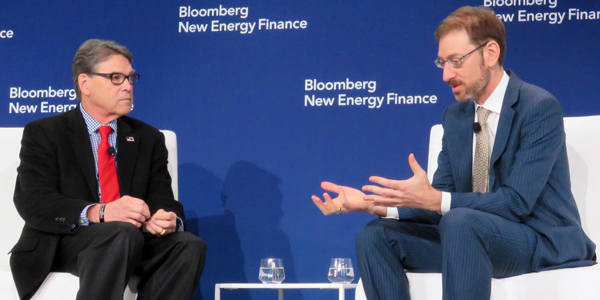By Rich Heidorn Jr.
NEW YORK — Energy Secretary Rick Perry insisted again Monday that coal and nuclear generation is essential to electric resilience but indicated he was not likely to declare an emergency to keep FirstEnergy Solutions’ struggling power plants operating.
FES asked the Department of Energy last month to issue an emergency order directing PJM to compensate coal-fired and nuclear power plants that have 25 days of onsite fuel with “full recovery” of their costs and a “fair return on equity.”
The company asked Perry to act under Section 202c of the Federal Power Act, which allows DOE to declare emergencies “during the continuance of any war in which the United States is engaged, or whenever [FERC] determines that an emergency exists by reason of a sudden increase in the demand for electric energy, or a shortage of electric energy.”
FES said the closing of its nuclear and coal generation would undermine the reliability of PJM’s grid, a contention the RTO dismissed, saying “there is no immediate emergency.” (See FES Seeks Bankruptcy, DOE Emergency Order.)
Perry spoke Monday at Bloomberg New Energy Finance’s (BNEF) Future of Energy Summit, where Ethan Zindler, head of Americas for BNEF, asked him to define “emergency.”
“When you flip on the lights and nothing happens,” Perry responded.
Would FES’ request qualify as an emergency that deserved intervention? Zindler asked.
“That is an issue in front of DOE that is being looked at as we speak,” Perry said. “My job is to find solutions to challenges that face us. The 202c may not be the way that we decide what is the most appropriate, most efficient way to address this. It’s not the only way.”
Perry did not elaborate on what path DOE might take, but he reiterated his longstanding position that an “all of the above” fuel strategy, including the retention of coal and nuclear, was essential to reliability. He also repeated his response to those who have complained that the emergency order — and the Notice of Proposed Rulemaking he sought from FERC last year to boost such generators — would undermine markets.
“Nobody was using the term ‘free market’ when we were talking about renewables and the subsidies that came from the government,” he said. “The reality is government affects the market every day.”
In an earlier session at the BNEF Summit, former FERC Commissioner Nora Brownell said granting FES’ request would be a “tragedy” for capitalism, markets and ratepayers. Noting the FPA’s reference to war or shortages, she predicted any emergency declaration would be overturned by the courts.
In January, FERC rejected Perry’s NOPR, which would have directed RTOs and ISOs to compensate the full operating costs of generators with 90 days of onsite fuel. The commission instead opened a new docket to receive input on the resilience issue. (See RTO Resilience Filings Seek Time, More Gas Coordination.)







